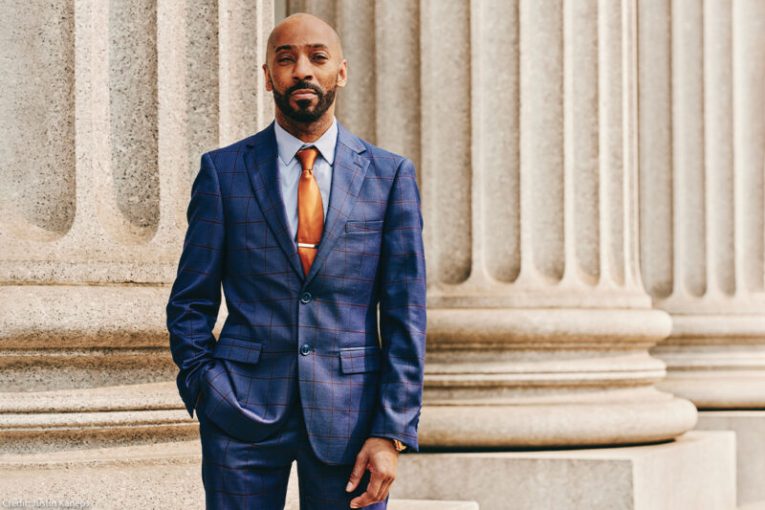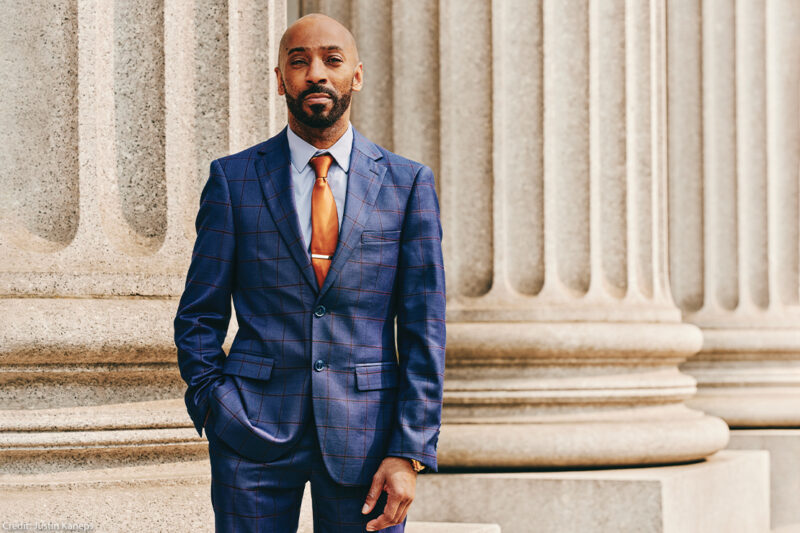

A class-action lawsuit challenges the permanent exclusion of people with felony convictions from serving on juries.
By Jay A. Fernandez
When Manhattan resident Daudi Justin was studying for his undergraduate degree at Columbia University in 2016, he received a jury summons. He was astonished to learn that he was permanently disqualified from serving on a jury because of a past felony conviction. Justin had been arrested for drug possession nearly a decade earlier, an experience in part that prompted him to pursue a law degree to fight for prisoners’ rights. Now a staff attorney with the Neighborhood Defender Service of Harlem, he represents clients in the same courts that bar him from sitting on juries.
Justin is co-lead plaintiff in a first-of-its-kind class-action lawsuit, Justin v. Tingling, filed in federal district court in Manhattan in December 2022 by the New York Civil Liberties Union (NYCLU). The case challenges the permanent exclusion of people with felony convictions from serving on juries. Decades of racialized policing and  prosecution targeting Black residents have resulted in the mass disenfranchisement of Black people in Manhattan from the jury pool. A jury ban mocks the very idea of the equal administration of justice and the guarantee of an impartial jury.
prosecution targeting Black residents have resulted in the mass disenfranchisement of Black people in Manhattan from the jury pool. A jury ban mocks the very idea of the equal administration of justice and the guarantee of an impartial jury.
“People [on juries] interpret things differently and may not understand the context of certain evidence that’s produced,” says Justin. “That’s why it’s harmful not having that diversity of perspective in the jury pool. We lose out on justice.”
Taking an approach that has proven effective in voter discrimination cases, the NYCLU is using statistical patterns of gross racial discrimination to argue against the jury ban in New York County. A favorable ruling could provide a legal blueprint for challenging similar criminal-record-based disqualifications state and nationwide. Manhattan has the worst disparities in arrest and conviction rates between Black people and white people of any county in the state. Approximately 25 percent of Manhattan’s otherwise eligible Black residents — a staggering 38,000 people — have been disqualified from jury service. Justin’s 2009 conviction came in the midst of a 20-year period during which Black people in Manhattan were convicted of felonies at a rate more than 21 times greater than white people. And the crime of which he was convicted — a remnant of the racist Rockefeller Drug Laws, which provided harsh sentences for drug offenses — is now classified as a misdemeanor.
The NYCLU also continues to advocate for the passage of the Jury of Our Peers Act, which would repeal New York’s lifetime categorical ban on jury service by people with past felony convictions. The bill, which will begin the 2024 legislative session on the chamber floor, moved through Assembly committees last year. In partnership with Assemblymember Jeffrion Aubry, the NYCLU has garnered support for this critical bill among advocacy groups and recruited co-sponsors.
Jury service is a fundamental right. It holds law enforcement, prosecutors, and judges accountable in a criminal legal system that is inherently biased.
“If more individuals who feel a certain way about the system are on the jury, they have the power to determine the cases,” says Justin. “So not only is jury duty participating in the democratic process, it’s also a way of exercising your political power.”
This article originally appeared in the ACLU magazine.
